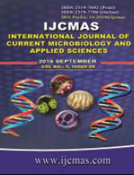


 National Academy of Agricultural Sciences (NAAS)
National Academy of Agricultural Sciences (NAAS)

|
PRINT ISSN : 2319-7692
Online ISSN : 2319-7706 Issues : 12 per year Publisher : Excellent Publishers Email : editorijcmas@gmail.com / submit@ijcmas.com Editor-in-chief: Dr.M.Prakash Index Copernicus ICV 2018: 95.39 NAAS RATING 2020: 5.38 |
Among a total of 30 cultivable rhizobacteria isolated from Maize (Zea mays L.) grown in tropical areas. Two isolates were evaluated and screened by using different plant growth promoting (PGP) traits. Based on the above studied parameters, rhizobacterial isolates AUPF25 and AUBM29 were selected for investigation and identified as Pseudomonas fluorescens and Bacillus megaterium by 16S rRNA gene sequencing. With the ability of this isolates to assess the impact of bioinoculants application on Maize (Zea mays L.) plant productivity was studied under pot culture conditions. Understanding the growth performances of maize plants inoculated with bacterial biofertilizers under pot culture conditions is a key to improve crop production further in field (15-20%). Maize plants with 4 different combinations of bacterial bioinoculants were applied as single and dual combinations. The experimental plants were maintained based on completely randomized block design (CRBD). Both biotic and abiotic factors that influence the plant growth including soil nutrient status, plant hypertrophy, phytochemical composition, bacterial population density were taken into consideration and those were analyzed. Among the bioinoculants combinations applied, dual combinations worked out better than the single inoculation. The treatment such as T4 (P. fluorescens and B. megaterium) was concluded as best combinations of bioinoculants and those were also found as compatible.
 |
 |
 |
 |
 |